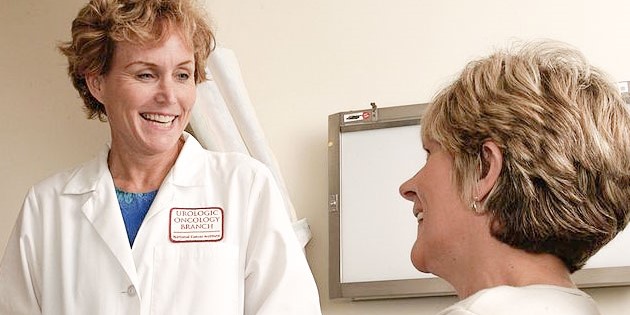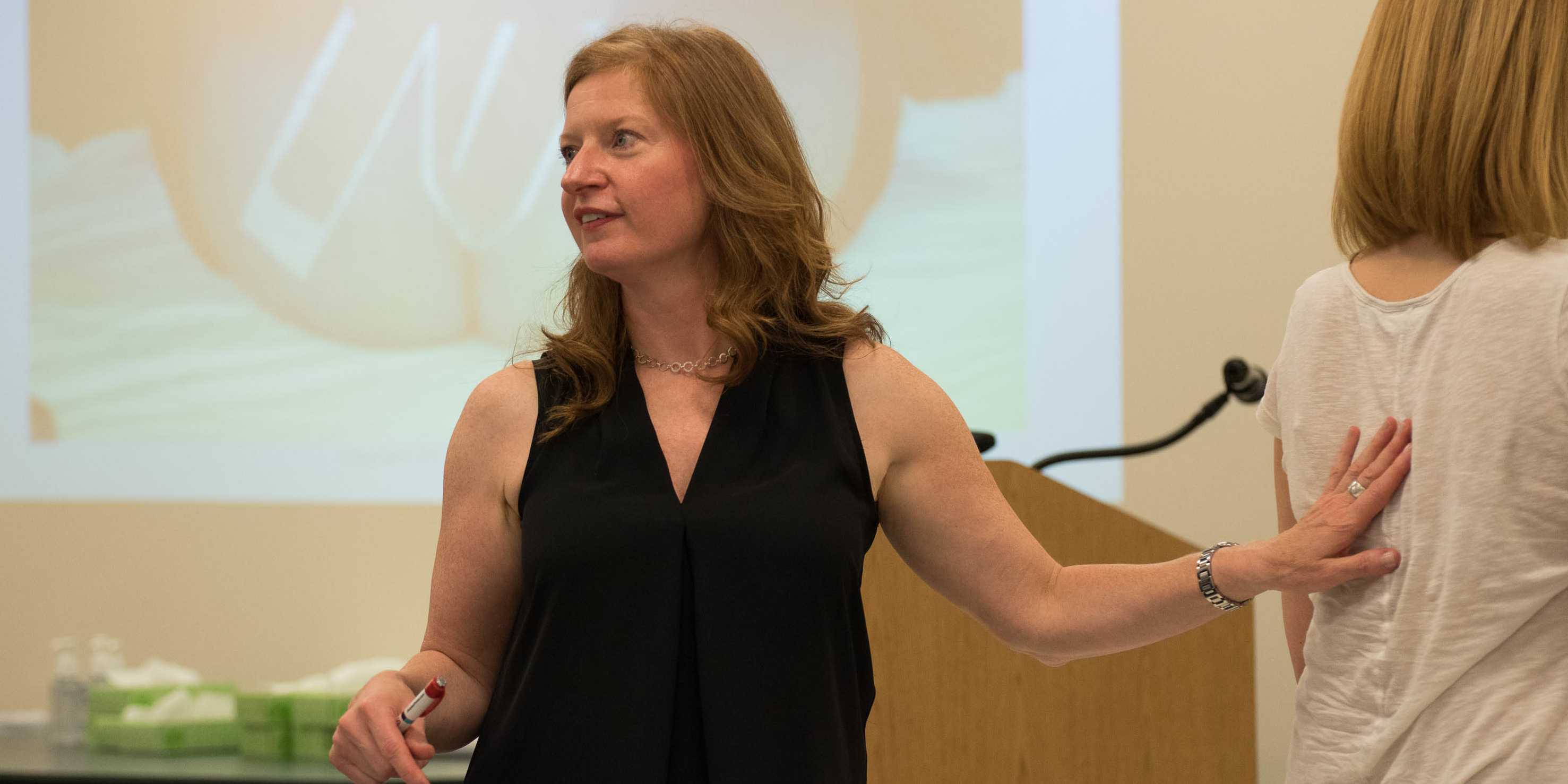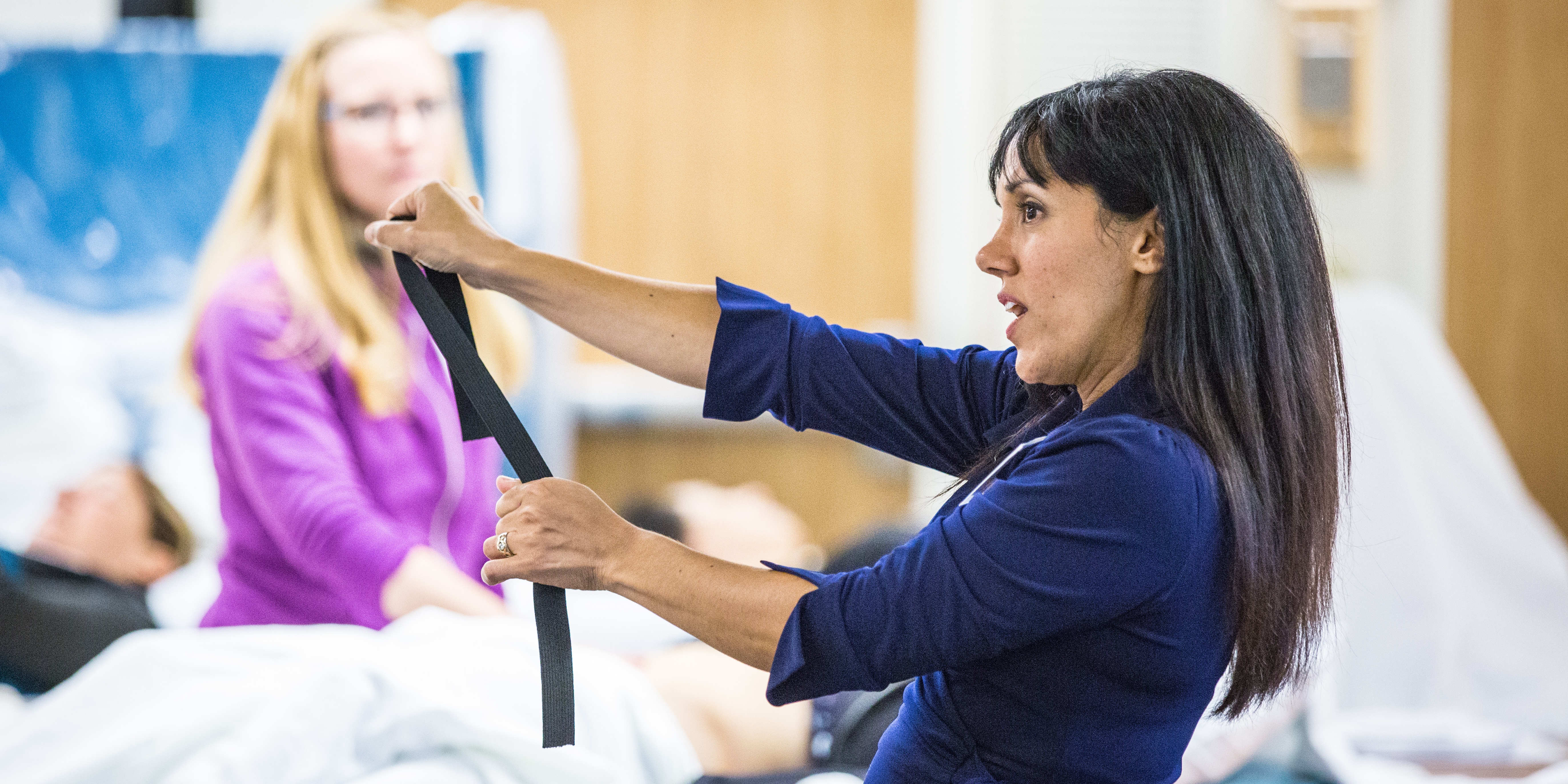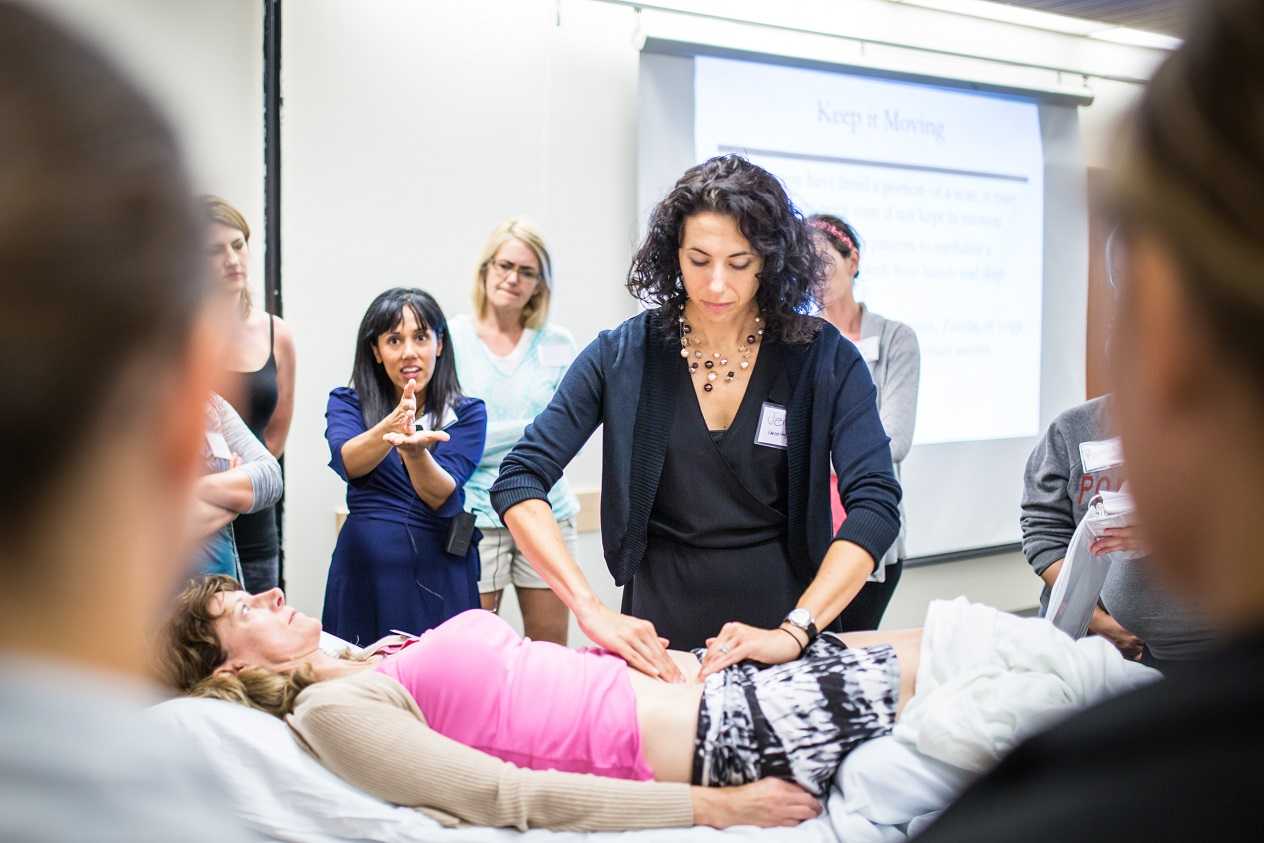Double Feature: Breast Cancer Awareness Month AND Menstruation and Pelvic Health
Breast Cancer Awareness Month

Allison Ariail, PT, DPT, CLT-LAANA, BCB-PMD is one of the creators of the Herman & Wallace Oncology of the Pelvic Floor Course Series. Allison Ariail is a physical therapist who started working in oncology in 2007 when she became certified as a lymphatic therapist. She worked with breast cancer, lymphedema patients, head and neck cancer patients, and the overall oncology team to work with the whole patient to help them get better. When writing these courses, Allison was part of a knowledgeable team that included Amy Sides and Nicole Dugan among others.
October is breast cancer awareness month.
This is a great time to acknowledge all of the many individuals who have fought against this disease with such bravery and determination! If you have the opportunity to work with these patients, you know what an inspiration they are.
There are many factors that influence the development of breast cancer. From genetics, to environmental exposures, to hormonal influences, there is an abundance of information available to us. So much so that it can be overwhelming to sift through all of it, but it is not only the development of breast cancer that we have information on it is also how breast cancer influences the development of other cancers.
According to Cancer Research UK, having breast cancer in the past increases the risk for the development of gynecological cancers. The risk is higher in those individuals who were diagnosed at a younger age, and with estrogen negative breast cancer.1 In an article in Oncology NEWS International, some statistics were shared. The overall risk for development of ovarian cancer in breast cancer survivors is 1.30. This risk is higher if a patient was diagnosed prior to age 50, with the highest risk in patients that were diagnosed with breast cancer between the ages of 15 and 39.2 Not only is there an increased risk for ovarian cancer, but also for uterine and endometrial cancers.3,4 Especially if a patient was prescribed Tamoxifen in order to block estrogen in the body. The use of Tamoxifen may be used for up to 10 years after a breast cancer diagnosis to prevent recurrence. However, there is a risk of endometrial proliferation, endometrial hyperplasia, endometrial carcinomas, and uterine sarcomas with the use of Tamoxifen. 4
Many patients are bombarded with so many appointments concerning their diagnosis of breast cancer that their pelvic examinations are neglected. Since these patients do have an increased risk for the development of a second cancer and the development of a gynecologic cancer, we should educate our patients to continue to receive their annual pelvic exams. When you work with these patients, support them through their current recovery from a battle with breast cancer, but also encourage them to follow up with their wellness exams as well!
Herman & Wallace offers a series that can help prepare you for working with gynecological cancer patients. In Oncology and the Pelvic Floor Level 1 (OPF1) we cover general oncology. The course addresses cancer treatment, short-term side effects, long-term side effects, and learn rehab techniques to help these patients. Then in Oncology and the Pelvic Floor Level 2A (OPF2A) and Oncology and the Pelvic Floor Level 2B (OPF2B) we go more in depth with pelvic related cancers and in OPF2A we cover topics related to testicular cancer, prostate cancer, penile cancer, and colorectal cancers. In OPF2B we cover topics related to gynecological cancers and bladder cancer.
All three courses instruct hands-on treatment techniques to help patients recover function and feel better. Please join us by taking this series to be able to help these patients!
References:
- Cancer Research UK. (2022, Feb 28). Risks and causes of ovarian cancer. https://www.cancerresearchuk.org/about-cancer/ovarian-cancer/risks-causes
- Breast cancer survivors at increased risk for ovarian cancer. (1999). Oncology NEWS International. 8(7). https://www.cancernetwork.com/view/breast-cancer-survivors-increased-risk-ovarian-cancer
- Li Z, Wu Q, Song J, et al. (2018). Risk of second primary female genital malignancies in women with breast cancer: a SEER analysis. Horm Cancer. 9(3): 197-204. doi: 1007/s12672-018-0330-0
- (2022). Tamoxifen and uterine cancer. ACOG Clinical, Committee Opinion. 601. https://www.acog.org/clinical/clinical-guidance/committee-opinion/articles/2014/06/tamoxifen-and-uterine-cancer
Menstruation and Pelvic Health

Have you ever wondered if there is something more you could do to help your patients understand and improve their Menstrual Experience? The Menstrual Cycle has an impact on the health and wellbeing of many of the patients we see as health care providers, and understanding this impact allows us to provide more effective care to our patients. Dr. Amy Meehan and I are excited to offer this informational, interactive, and engaging course designed to provide you with tools and experience to invite your patient to engage in a Menstrual Dialogue to discuss topics that can be challenging and sensitive with the goal of making real changes in their Menstrual Experience. We identify Menstrual Stressors and create an Individual Combination Menstrual Action Plan designed to improve the overall Menstrual Experience. We focus on non-hormonal, non-surgical, and non-prescription interventions to be carried out in holistic collaboration with a physician and other health care providers. Although there is much overlap among the topics of fertility, contraception, and menopause, we don’t focus on these because each is a course unto itself.
In pre-recorded video sessions, we review of anatomic, physiologic, and cultural aspects of the Menstrual Experience and provide clarity to complex biological processes. We discuss what is a ‘normal’ parameter for a Menstrual Cycle and what symptoms should prompt a visit to a physician. We explore interesting topics such as cultural Menstrual Milestones, Menstrual Concealment, post-Traumatic Cycling, envisioning an ‘Ideal Menstrual Experience’, and even identifying and celebrating positive aspects of the Menstrual Experience. We use provocative thought experiments to re-envision the Menstrual Experience in a more positive light. Some of these are It Takes a Village, If Men Could Menstruate, The Unapologetically Cycle-Friendly Wardrobe, and The Kindest Gift: A Better Menarche.
In the live virtual sessions, we demonstrate what to expect in terms of Menstrual Volumes on different days of a typical cycle. We demonstrate and discuss pros and cons, care and use, and absorptive and collective properties of multiple Menstrual Products: 1) liners, pads, interlabial pads (disposable and re-usable), 2) tampons (different absorbencies, shape when expanded, applicator vs no applicator), 3) cups and discs (insertion and removal techniques and maintenance), 4) period underwear (effective, comfortable, stylish, and fun options), 5) period overnightwear (to decrease anxiety about overnight flooding), 6) period activewear (effective, comfortable, stylish, sporty, and fun options for gym, yoga, and around town), and 7) period swimwear (one piece and bikini, for competition, or just chillin’ in the sun). We learn how to create a Flow Management Plan that combines multiple Menstrual Products in the most effective way for each day of flow. We use common kitchen items to simulate different kinds of vaginal discharge your patients may experience and know when to seek help from a physician. We explore Menstrual Tracking and Menstrual Diaries to increase Menstrual Mindfulness of internal cues to adjust nutrition, fitness, and lifestyle. Dr. Meehan shares her expertise in applying yoga and exercise techniques to alleviate Menstrual Symptoms and carry out high-performance cycling.
We hope the time we spend together in this course will give you tools to help your patients create 1) Menstrual Optimism: living in the belief that the present is full of possibility for a better Menstrual Experience, 2) Menstrual Confidence: the belief that you can participate in things that are important to you…on ANY day of the month and that your voice is important…on EVERY day of the month, and 3) Menstrual Pride: living with a deep feeling of satisfaction, happiness, and contentedness that your body is the way it is and that it works the way it does…despite the challenging aspects of the Menstrual Experience and because of the rewarding aspects of the Menstrual Experience.
We look forward to taking steps with you on this exciting Menstrual Journey.
Dr. Niko and Dr. Amy
Course Testimonial
The Menstruation and Pelvic Health course was very helpful in deepening my understanding on how to enhance pelvic health treatment during the different stages of a woman’s cycle.
The video lectures and the material provided were clear and easy to digest and the live zoom class provided additional important information.
I can definitely say that my daily practice has improved since taking this class.
-Martina
Application Fee: $575.00 Experience Level: Beginner Contact Hours: 19 hours
Course Dates: October 28-29, 2023
Description: This course is designed for clinicians who want to obtain an advanced knowledge and skills to educate patients on non-hormonal, non-surgical, and non-prescription interventions for improving the Menstrual Experience. Developed by Nicholas Gaffga, MD, MPH, FAAFP and presented together with Amy Meehan, PT, DPT, MTC, this course is geared towards the pelvic rehab provider looking to impart Menstrual Interventions that:
- Put control in the hands of people who menstruate to identify and carry out the interventions that are appropriate to them
- Use a holistic approach and advanced knowledge and familiarity with body and mind
- Emphasize healthy practices that can positively impact the Menstrual Experience and beyond, in areas such as mental health and chronic diseases
- Discover root causes of issues, rather than quick fixes, to have benefits that are sustainable across the lifespan.
By accepting you will be accessing a service provided by a third-party external to https://hermanwallace.com/









































